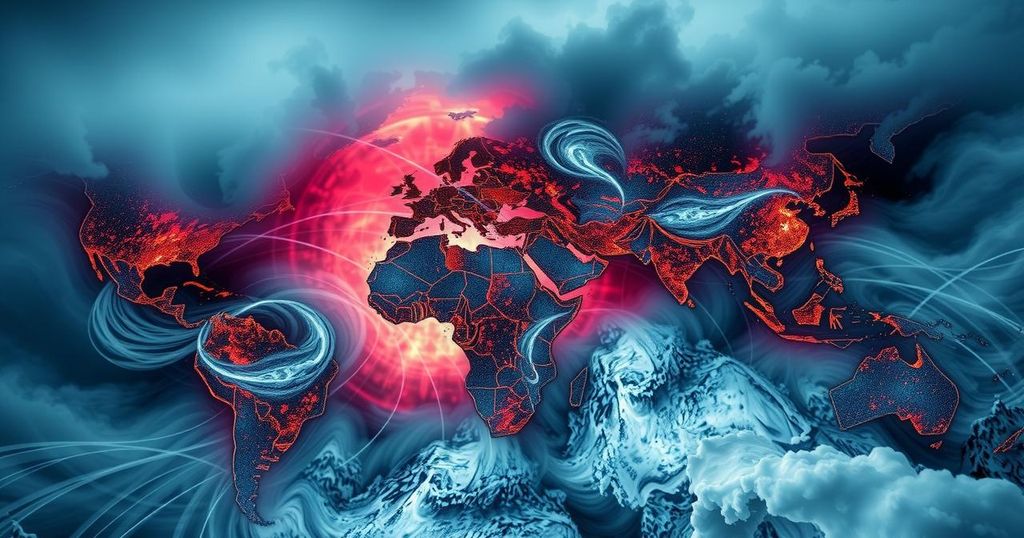In 2024, extreme weather intensified due to record global temperatures, causing significant fatalities and displacements worldwide. Climate change contributed to at least 3,700 deaths from severe weather events. Floods, driven by climate-related rainfall, and an average of 41 additional dangerous heat days underscored the urgent need for global climate action. Major storms and biodiversity loss in crucial ecosystems further exemplified the harsh realities of a warming planet.
In 2024, extreme weather phenomena reached unprecedented levels, driven by record-breaking global temperatures. This year was marked by dangerous heatwaves, devastating floods, and catastrophic storms, resulting in the loss of thousands of lives and the displacement of millions. The rise in temperature, quantified at 1.3°C due to human activity, underscores the critical importance of transitioning away from fossil fuels to mitigate the impacts of climate change on the planet.
Analysis of 26 significant weather events in 2024 revealed that climate change contributed to at least 3,700 deaths and countless displacements. This figure represents only a fraction of the 219 events recorded, indicating that the total fatalities linked to extreme weather may reach tens or hundreds of thousands. The emerging crisis of climate-induced events highlights the urgent need for effective response and adaptation strategies around the globe.
The correlation between heightened global temperatures and increased rainfall resulted in catastrophic flooding across multiple regions, including Kathmandu, Dubai, and Southern Appalachians. Out of the 16 floods analyzed, 15 were exacerbated by climate change-related rainfall increases, revealing fundamental climatic principles where warmer air carries more moisture. Critical failures in early warning systems and inadequate flood defenses in regions like Sudan and Brazil resulted in alarming death tolls.
Climate change introduced an alarming average of 41 additional days of dangerous heat in 2024, particularly affecting small island and developing nations already vulnerable to environmental shifts. These jurisdictions exemplify the far-reaching ramifications of extreme heat, a phenomenon that remains underreported.
While El Niño played a role in some extreme weather events, studies indicate that climate change emerged as a more dominant factor, especially regarding devastating droughts in the Amazon. The increasing intensity of storms, such as Hurricane Helene and Typhoon Gaemi, further illustrates how rising sea temperatures and warmer air contribute to the ferocity of weather systems.
Lastly, the Amazon rainforest and Pantanal Wetland suffered considerable damage from severe drought and wildfires, resulting in significant biodiversity loss. Preserving these essential ecosystems is crucial due to their role as major carbon sinks, vital for global climate stability. Preventing deforestation is imperative to safeguard against both drought and wildfire threats, as lush vegetation is crucial in maintaining moisture levels.
The article discusses the alarming impacts of climate change witnessed in 2024, where extreme weather events became increasingly destructive and lethal. It highlights significant factors that amplified the severity and frequency of these events, including human-induced global warming and natural phenomena such as El Niño. This comprehensive analysis reflects on the dire implications of climate change on human safety, natural ecosystems, and the urgent need for global action to combat these challenges.
The year 2024 serves as a stark reminder of the immediate and escalating dangers posed by climate change. With extreme weather events resulting in unprecedented casualties and widespread displacement, it is critical that global efforts focus on reducing reliance on fossil fuels and enhancing adaptive strategies. Protecting vulnerable ecosystems, particularly the Amazon rainforest and Pantanal Wetland, is essential to mitigating climate impacts and ensuring long-term planetary health.
Original Source: reliefweb.int






